|
STEPHENVILLE, Texas -- After a frustrating home loss, men's basketball coach Billy Gillispie sits in his office in a hallway of the 3,000-seat Wisdom Gym on the campus at Tarleton State University. It's late, he's disappointed, and he tells both of the reporters on hand that he wants to "hurry up and get this over with," then appears to be physically pained by the lackluster questions. That might sound like what you'd expect from the Billy Clyde Gillispie experience, another scene of a Division I coach who hates losing more than he loves winning. But tonight, he has more important people waiting. First, naturally, there's a recruit, someone Gillispie mentioned the day before on his radio show as a "program-changer." Then, there's a visitor who drove nearly seven hours to watch this game and the reason he's even sitting in this office in 2022: Ericka Downey, the woman who gave Gillispie her kidney. This is not a story about a kinder, gentler "Billy Clyde." He still hates to lose, just as he did in higher-profile stops at Texas A&M, Texas Tech and his most famous one at Kentucky. His practices still look like rugby matches. It's not a story about perspective, about how Gillispie, the workaholic whose high blood pressure led him to need a kidney transplant, has a new worldview. "I've been a 24-hour-a-day basketball guy before, and I'm a 24-hour-a-day basketball guy now," the 62-year-old coach said. "As far as working, being determined and helping players get to where they want to go and building programs to the level that we've been able to build programs, there's not a whole lot of change." But it is about why the former SEC and Big 12 coach -- who had a dazzling rise to the top of the college basketball world and an even more precipitous fall -- is in Stephenville, Texas, a town of about 20,000 people 70 miles southwest of Fort Worth known as the "Cowboy Capital of the World." It's because he thinks he can win a national championship here.
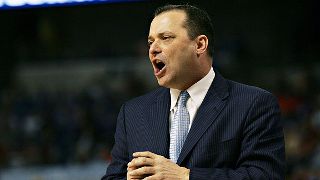 IF YOU MISSED Gillispie's arrival at Tarleton State, consider that he was hired on March 30, 2020, when the coronavirus pandemic had paralyzed much of the world. His introductory news conference was held virtually. Gillispie, who had been coaching at Ranger College (a junior college about 40 miles away), took on leading Tarleton as it moved from Division II, where it had been a basketball power, into Division I. This also marked his return to the sport's top level after resigning at Texas Tech after one season in 2012, before which he had been fired at Kentucky after two tumultuous years. Even amid those episodes, Gillispie's basketball acumen had never really been in doubt. His rise was remarkable. The son of Clyde, a truck driver, and Winifred (known as Wimpy), who worked at the local grocery store, Gillispie dreamt of becoming a coach growing up in Graford, Texas, a town of about 500 people. He got his first head-coaching job at Copperas Cove High School -- incidentally, the athletic director who hired him was the football coach, Hal Mumme, who would go on to become the Kentucky football coach -- in 1987. By 2002 he got his first college head-coaching job at UTEP, where he finished 6-24 in his first year, then went 24-8, the biggest turnaround in NCAA history. In 2004, Texas A&M gave Gillispie his first Power 5 job. In Gillispie's first year, an A&M team that had finished 7-21 and 0-16 in the Big 12 the season before went 21-10 and 8-8. Two seasons later, the Aggies went 27-7 with a 13-3 record in the conference, earning a No. 3 seed in the NCAA tournament, the highest in school history. From there it was on to Kentucky, where Gillispie went a substandard 40-27 in two seasons and was fired. Texas Tech gave Gillispie a chance to resuscitate his career, but his time in Lubbock went badly and his Texas Tech exit was particularly complicated. That September, Gillispie was hospitalized on two occasions with blood pressure issues as the university investigated complaints of mistreatment by players and allegations that Gillispie exceeded NCAA limits on practice times. On the court, Tech went 8-23 and Gillispie resigned. 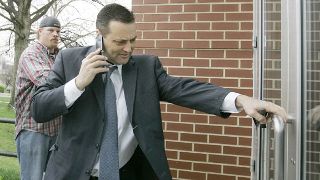 Given his track record of breathing life into programs, the quick exits at Kentucky and Texas Tech were stunning. "I think because of being a victim of our success, turning around things so fast, I might have approached the last Division I jobs a little bit different because I just felt so much pressure," Gillispie said upon his introduction at Tarleton. "I probably put too much pressure on myself, probably put too much pressure on our staff to perform and probably put too much pressure on the players because of the success that we had. That's not going to make us try to slow down any, but we're going to learn from it and try to be better. "I've had so many peaks, but there's been some valleys associated with Billy Gillispie too, whether it was health or whether it was bad decisions by me." Gillispie had gotten back into coaching in 2015 at Ranger, where he had played basketball and baseball from 1978 to 1980. He took over a team that went 2-23, which began an eventful five years. In Year 1, Ranger finished 31-7 and finished in fourth place in the NJCAA tournament. But the school had to vacate those wins when it was discovered that a player's trainer had submitted his name for entry into the NBA draft years before, rendering him ineligible, even though he had withdrawn it. In Year 2, Gillispie retired in midseason in December 2016 on the advice of his doctors due to more health concerns from the blood pressure. Yet he returned the next season, saying he'd rather die coaching than not be on the sideline. Then, in November 2017, he was hospitalized after a game for pneumonia, and doctors discovered he'd recently had a heart attack and shocked his heart back into rhythm. Two weeks later, he was told that he was in dire need of a kidney transplant or he'd have to begin dialysis within six months. He called Brad Townsend, a Dallas Morning News reporter who had covered him extensively, just to talk. Townsend felt like someone of his stature needing a transplant would be a worthwhile story, but Gillispie objected. Townsend argued that there were about 100,000 Americans in need of this same kidney procedure and that this story might help others. Eventually, Gillispie relented. In December 2017, Downey stumbled across the Dallas Morning News story on Twitter and even though she didn't know Gillispie, it stopped her cold when she read he needed a donor. 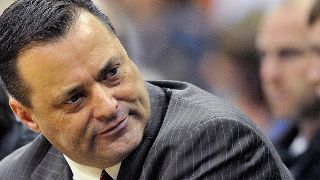 "In my whole life, I've never asked anyone for anything," Gillispie told Townsend. "I'm still not. ... I don't even know that I would take one [a kidney]. I know that sounds stupid, but I wouldn't take a donated kidney if it was going to have any kind of adverse [effect] on anyone. I mean, I've had a great life. I would like to be around for whatever [years], but I'm not selfish in that regard. I'm selfish in some, but not that regard." Downey began a social media campaign to find Gillispie a kidney while also contacting the Mayo Clinic for a test kit. Incredibly, she was a match. By this time, Gillispie was in Stage 4 renal failure, which means he had about 15% of normal kidney function. The two, who had exchanged a few texts and had just one phone call, finally met for a dinner and celebration during the Final Four in San Antonio. After months of anticipation, the surgery would finally happen in April 2018. In the hospital, Downey and Gillispie went for walks together. Gillispie was relieved by how quickly she recovered. Downey was relieved the kidney was functioning, and staff raved about Gillispie's determination to be up and around. And Downey, who was adopted by her grandparents, who had both died, said she gained a new family. A year after the transplant, Gillispie led Ranger to the NJCAA national championship game and Downey was honored at the Final Four with the U.S. Basketball Writers Association's 2019 Most Courageous Award. Downey's bond with Gillispie has given her a different perspective on the coach who has sometimes veered toward self-destruction. "He has a tough exterior," she said. "But I think what I've seen throughout the process is his humility and his softness. I mean, he's got the biggest heart of anyone that I know. We got off the phone the other day and then he called right back. I said, 'Oh, did you forget something?' He said, 'Yes. I forgot to tell you how much you mean to me. There's not a day that goes by that I don't thank God for what you've done for me. I forgot to say that, so I didn't, I didn't want to miss that opportunity.'" That night after the home loss, Gillispie waved Downey in like one of his assistant coaches or family members as she sat and watched the coach work. "Without Brad writing that story, I don't know what would have happened," Gillispie said. "You would hope that good things happen, but there were a lot of people more deserving than me of getting a kidney. Without him, none of that happens and Ericka Downey doesn't exist in my life." But with second chances in life and his career, why Tarleton and why now?
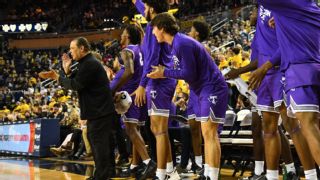 GILLISPIE HAS ALWAYS been a dogged recruiter, and he knows how to work a sales pitch. But, he says, this isn't just a pitch. Tarleton is coming. This is a fact. "It's only a matter of time before it's a major league powerhouse. It's not going to take too long," Gillispie said. "I'm not talking about on an area level. I'm not talking on a statewide level. ...I think the word's already getting out at the national level because of how we played a lot of great opponents in the preseason. ... This is a legitimate championship contender." The Texans were 10-10 last year in their first Division I season, with a sporadic schedule because of COVID-19 cancellations. This season, on a recent visit on a Friday morning, the Texans were 11-13 with a game the next day against former Division II rival Abilene Christian. Although Gillispie isn't happy with that record, there's also that schedule he referenced. The Texans started 1-6 because Gillispie scheduled an all-star slate of nonconference road games: at Stanford, Kansas, Wichita State, Michigan and Gonzaga. Gillispie reminded the college basketball world of his coaching prowess in the process. Although the Texans didn't take down any of the big names, they did put a scare into a few of them. "There is not a team we will play all year that plays harder and plays better defense than Tarleton," Gonzaga coach Mark Few said before the game. Gillispie's team came in as a 31.5-point underdog. With just over five minutes remaining, Gonzaga held a 2-point lead. The Zags finished on a 10-2 run to win 64-55 but scored their fewest points at home in five years, 36 points below their season average to that point and still the fewest they've scored all year. Texas Tech, which lost 69-55 in a neutral-site game in Phoenix, is the only other team to hold the Zags below 70 points this season. "I just want to play the best. Why not?" Gillispie said, noting that he thought his current roster was tough enough to stand up to the test. "No. 1, you get great exposure, and I think anytime you're building a program, exposure needs to be at the top of the list. It's different for every program. For us, I think it's perfect." Gillispie isn't the type to celebrate moral victories. But as a new Division I member, Tarleton isn't eligible for the NCAA tournament until 2024-25, although it can play in other postseason tournaments such as the CBI or the newly rebranded Basketball Classic (formerly the CIT). "Most teams don't advance in the NCAA tournament," Gillispie said. "There's 34 teams that get knocked out in one round. We're playing five or six [recent] No. 1 seeds. Is that better than playing one game in the NCAA tournament? No, there's nothing better than the NCAA tournament. But if you can't play in the NCAA tournament, why not play six NCAA tournament No. 1 or No. 2 seeds?" And in Gillispie's blueprint, the powerhouse in Spokane is the exact reference point for what he believes Tarleton basketball can be. "Gonzaga wasn't Gonzaga forever, but they've been really good for a long time," he said. "You can basically do it anywhere that has commitment." Tarleton's president, Dr. James Hurley, who steered the Texans into Division I and the WAC, grew up in Kentucky and played basketball at the University of Pikeville. The athletic director, Lonn Reisman, was one of the winningest coaches in the country, winning 691 games, including 654 at Tarleton, and taking the Texans to two Division II Final Fours, in 2005 and 2015; he also is credited as the Southeastern Oklahoma State assistant who discovered a raw 21-year-old Dennis Rodman playing in junior college. John Sharp, the chancellor of the Texas A&M system, of which Tarleton is part, is a Gillispie fan who reportedly pushed for his hire and issued a statement welcoming him back to the family when he was hired. There is no shortage of passion from school leadership for Gillispie's vision. And aside from its reputation as a center of rodeo culture -- Tarleton's rodeo team has won seven national championships, and downtown Stephenville has a walk of fame featuring several pro rodeo stars -- the town is used to producing and supporting winners. It also stakes its claim to the title of "City of Champions." Stephenville High School has won six state championships in football since 1993, including a 16-0 season last year. The volleyball team won state in 2003, and the girls' soccer team added titles in 2017 and 2019. 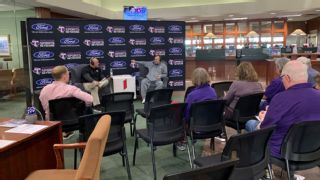 "This is a city that loves to win," Gillispie said. "This city is built on hard work, blue-collar people that, whatever they have, they've made it. I love those kinds of people." That matters in the new landscape of college sports, with the name, image and likeness rules allowing for players to earn money on endorsements. Mumme, Gillispie's old boss, is a Tarleton State alum who has his own NIL company and said he's hard at work helping the school. Gillispie said there are several people who have told him they are working to position Tarleton among the top of the Group of 5 schools. "We're trying to become the absolute best one as far as the NIL opportunities for kids to come here," Gillispie said. "I want everybody to look at our roster starting next year and say, 'How did they get that guy?' This is real for us.'" Now he just needs the players. He is connected across Texas and popular among the high school and junior college coaches, who see him as one of them. "We're located in a perfect spot to recruit anybody in a great state filled with players and the best junior colleges there are," he said.
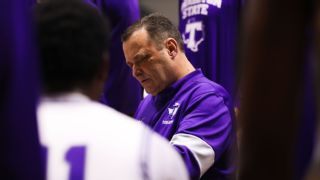 DURING A TWO-HOUR practice on a Friday before a game day, with a recruit and a reporter watching, the team gathers for a prayer, then breaks into a full-on sprint as soon as "amen" is said. Gillispie starts drill after drill, seemingly 80% of which are focused on defense, by shouting, "GUARD 'EM!" The word "tough" seems to dominate every bit of feedback, like when he throws his hands down and says, "Awww, that ain't tough!" with a look of disgust. Every detail matters. A player who doesn't squeeze into the huddle tightly enough -- "too loose!" Gillispie exclaims -- is ordered to flip his jersey from purple to white, the scout team's colors, and switch with a backup who gets promoted. Two players drew blood while taking charges, visited a trainer, got patched up and came back. Gillispie's practices are so notoriously grueling that legendary UTEP coach and taskmaster Don Haskins, who loved watching them during Gillispie's El Paso tenure, once said they were the hardest he'd ever seen, telling the Lexington Herald-Leader, "I wouldn't want to play for him." One of Gillispie's former players at Ranger, Josh Simmons, said not much has changed. "Coach has a real high definition of tough love that I've never seen before," Simmons told the Bryan-College Station Eagle. "When you are first getting used to it, it's like 'Wow, how am I going to get through this?' After a while when you see things manifest and you buy in, he's like the father who never says he loves you, but he loves you." And Tarleton's Freddy Hicks, a 6-foot-6 sophomore from Searcy, Arkansas, who was last year's WAC Freshman of the Year, told Tarleton Radio Network host Byron Anderson of his experience with Gillispie. "He's definitely gonna challenge you mentally. It's not gonna be easy," Hicks said. "But if you want to be good, it's not gonna be easy. He tries to teach you a lot on the court and every day is teaching you something new." 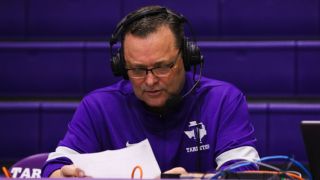 Gillispie said it's an expectation he makes clear to prospective recruits. "We go at it straight on," he said. "We say, 'Hey, we're going to coach 'em hard and we're going to love 'em harder. We're going to make this an advantage every single day. Let some guys be soft if they want to. In the end, every game was won by the toughest team, unless somebody just makes a ton of shots. So we recruit the right guys that want to get better. And you only get better if you go hard." Clearly, Gillispie isn't one to change your mind about who he is. He's not much for sentimentality. Or regret. "I got fired at Kentucky, but every single day we did what they asked us to do," he said. "I'm not mad at them or whatever. That's just the way sports go. We didn't win enough games in two years. You just move on." 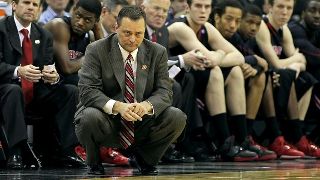 On if it ended badly at Texas Tech: "Unfortunately at Tech, it was a health issue and there wasn't anything they could do or I could do," he said. "I put my health first for the first time in my life, and so it didn't finish bad there in my opinion. It finished great." He will admit to one big mistake. It wasn't leaving Texas A&M for Kentucky. Instead, it was going to Kentucky at all when, in his mind, the college basketball power dynamics were shifting. "I thought at that time that you had to be at Kentucky, Indiana, UCLA, North Carolina, Duke, Kansas, one of those places," he said. "It started changing right then to where the players were being controlled by outside people other than high school coaches or whatever. So you could do it at any school, as we have seen, and you don't have to be at one of the power places." To his point, Oral Roberts made the Sweet 16 last year. Five Texas schools advanced out of the first round of the NCAA tournament, including North Texas, which upset Purdue. The only two who lost in the first round were Texas -- which lost to Abilene Christian -- and Texas Southern, which was a 16-seed that lost to top-seeded Michigan. So is Gillispie's ambition that far-fetched? After 30 years of Division II success, is it that much more unlikely than Butler, Florida Gulf Coast or George Mason? "Tarleton's stayed under the radar for so long," Mumme said. "Billy's gonna help put 'em on the map." Gillispie's conference schedule includes teams such as Utah Valley, California Baptist and Chicago State. There aren't 20,000-seat arenas in the WAC. His coaching show is in the lobby of the First Financial Bank in Stephenville, where customers walk by and visit with tellers while he's speaking. His Texans are 12-15 with four games remaining and he has two more years until he's eligible for the WAC postseason tournament or the NCAA tournament. But for a "24-hour-a-day basketball guy," Gillispie says none of that matters. "I never thought that I was anything special when I was at the University of Kentucky, and I never thought I was anything less when I was at Ranger College," Gillispie said. "The big time is where you are. No matter where I've been, I've always thought that."
|


